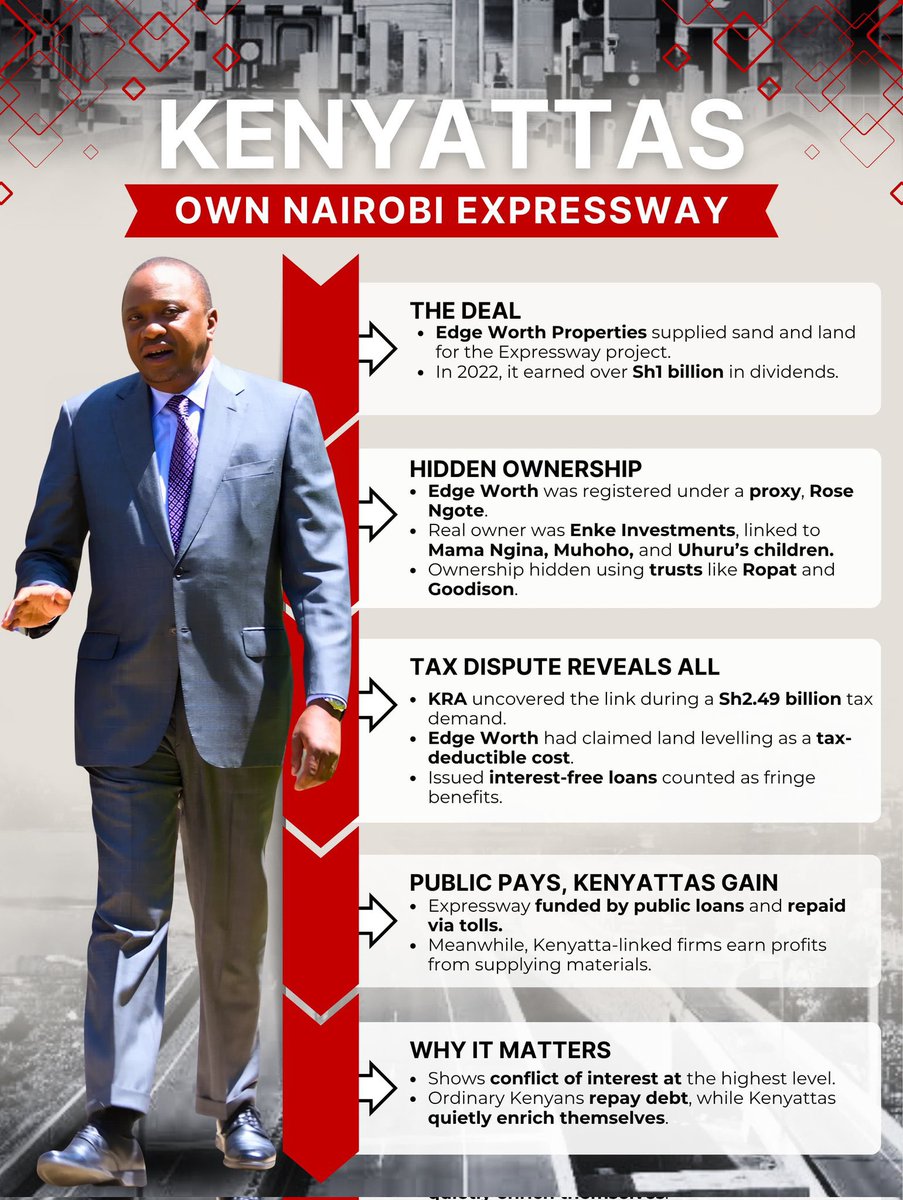z
Nairobi Expressway Scandal: Hidden Profits and Power Games
The Nairobi Expressway scandal has ignited national debate, revealing how this flagship infrastructure project—once celebrated as a hallmark of progress under the Big Four Agenda—has now become a symbol of elite profiteering and political influence. The Nairobi Expressway scandal centers on allegations linking the Kenyatta family to covert billion-shilling profits through proxy companies and undisclosed financial interests, casting a long shadow over Kenya’s development narrative.
Nairobi Expressway Project: A Controversial Legacy Under Scrutiny
Unveiled in October 2019, the 27-kilometer elevated Nairobi Expressway was presented by President Kenyatta as a transformative Public-Private Partnership (PPP) with China Road and Bridge Corporation (CRBC). Under the Build-Operate-Transfer (BOT) model, CRBC, through its subsidiary Moja Expressway Group, would fund, build, and operate the road for 27 years before handing it back to the Kenya National Highways Authority (KeNHA). The project’s original cost was pegged at KShs. 62 billion, later rising to USD 668 million. The public was assured that the project would be self-financing through toll collection, with minimal burden to taxpayers.
For more on how PPPs work in Kenya, read this detailed breakdown from the World Bank.
Hidden Profits and Insider Deals in the Expressway Scandal
Media investigations, notably from Nation and Africa Uncensored, suggest that entities linked to the Kenyatta family benefited massively from the project through supply deals and land transactions. A company known as Mountain Hill Global, reportedly tied to Muhoho Kenyatta (Uhuru’s younger brother), allegedly secured contracts to provide essential construction materials and even land. Tax records and court filings indicate revenues exceeding KShs. 1 billion in one year alone for the company.
While a viral graphic falsely claimed that a portion of toll fees were paid directly to Mountain Hill Global, fact-checkers at Africa Check debunked that claim. However, the broader allegations around insider deals and preferential treatment remain a topic of intense public scrutiny.
How Kenyans and Civil Society Are Responding to the Expressway Scandal
President William Ruto’s administration has not directly accused the Kenyattas but has consistently highlighted the need to audit major infrastructure deals from previous governments. Civil society actors, economists, and human rights groups have condemned the expressway for being a “road for the rich,” citing high toll fees, environmental concerns, and displacement of residents.
Public outrage is widespread. Many Kenyans, facing economic hardship, see the allegations as confirmation of state capture by political dynasties. The silence from the Kenyatta family has only deepened public suspicion, especially given their historical entanglements with land acquisition and offshore holdings.
Proxy Companies and Elite Capture in Kenya’s Infrastructure Sector
This scandal fits into a long pattern of powerful elites using proxy companies to benefit from state projects. After independence, land meant for redistribution was often claimed by politically connected individuals, including the Kenyatta family. The 2021 Pandora Papers revealed the family’s offshore assets hidden in tax havens like Panama and the British Virgin Islands—activities legal in isolation, but ethically murky for a sitting president espousing anti-corruption values.
Learn more about the Pandora Papers and global offshore finance networks at the International Consortium of Investigative Journalists (ICIJ).
Kenya’s Toll Road Controversies: Cost of Mismanaged Expressway Projects
If substantiated, these allegations illustrate how a public project can be turned into a private cash cow. Key consequences include:
- Erosion of public trust
- Diversion of funds from essential services
- Increased public debt and economic inequality
- Deterrence of ethical foreign investment
- Institutional weakening through manipulation of procurement processes
Holding Power Accountable: The Future of Public Infrastructure in Kenya
The Nairobi Expressway scandal raises urgent questions about governance, transparency, and elite influence in Kenya. The project, once a symbol of progress, now risks being remembered as a cautionary tale of how public infrastructure can be hijacked for private gain. As investigative journalism continues to uncover the truth, Kenyans are demanding accountability—not just for the expressway, but for a system that has too often served the few at the expense of the many.
For related reading on state capture and elite influence in infrastructure projects, visit Transparency International Kenya.
To learn more about how data can drive inclusive governance, social justice, and public accountability, contact us now!!
Together, let’s build a Kenya where public resources serve the many — not the few.
